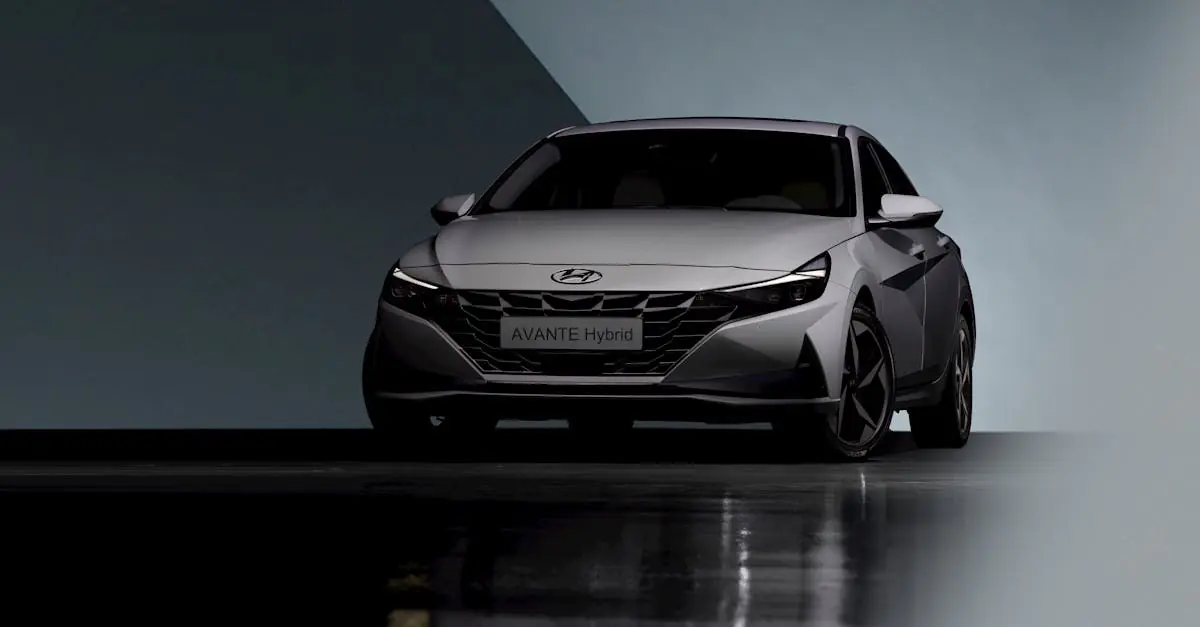Table of Contents
ToggleIn the battle of the eco-friendly titans, hybrid and electric vehicles are like the superhero duo of the automotive world. One’s a gas-sipping sidekick that loves a good road trip, while the other’s a silent ninja, gliding through the streets on pure electric power. With gas prices soaring and the planet begging for a break, choosing between these two can feel like picking between a comfy couch and a trendy bean bag—both have their perks, but which one fits your lifestyle better?
Overview of Vehicle Types
Hybrid and electric vehicles represent two innovative approaches to modern transportation. Each type offers unique features appealing to diverse drivers.
Definition of Hybrid Vehicles
Hybrid vehicles combine traditional gasoline engines with electric motors. This dual system enhances fuel efficiency, allowing for longer trips without frequent refueling. Owners appreciate smooth transitions between electric and gasoline power, optimizing performance in various driving conditions. Typical hybrid models use regenerative braking to recharge their batteries, reducing energy waste. They engage both engine types to increase fuel economy—fuel consumption can average around 50 miles per gallon or more in certain models. Furthermore, hybrids offer versatility, making them suitable for those who may not have consistent access to charging stations.
Definition of Electric Vehicles
Electric vehicles run solely on electric power, relying on large battery packs for propulsion. These vehicles contribute to environmental sustainability by producing zero tailpipe emissions. Electric motors deliver instant torque, resulting in quick acceleration and smooth driving experiences. Charging options vary, including home chargers and public charging stations, providing flexibility for owners. Range varies widely depending on the model, typically falling between 150 to 370 miles per charge available in many top brands. Electric vehicles appeal to eco-conscious consumers, combining technology with sustainability to address modern transportation challenges.
Advantages of Hybrid Vehicles
Hybrid vehicles offer unique benefits that cater to diverse driving needs. They blend traditional gasoline engines with electric motors, resulting in impressive fuel efficiency.
Fuel Efficiency
Hybrid vehicles excel in fuel efficiency. Many models achieve around 50 miles per gallon or more. Utilizing both gasoline and electric power, they reduce fuel consumption significantly. Regenerative braking contributes to this efficiency by capturing energy during deceleration. Drivers experience fewer trips to refuel, leading to cost savings over time. This efficiency aligns with changing consumer preferences amid rising gas prices.
Range and Convenience
Range represents another significant advantage of hybrid vehicles. Many hybrids can travel longer distances than typical electric vehicles. With a combination of electric and gasoline power, they aren’t dependent on charging stations. This feature suits those who often drive long distances or live in areas with limited charging infrastructure. Convenience arises from reduced anxiety about running out of battery power. The ability to switch to gasoline at any time adds to the vehicle’s versatility. These qualities make hybrids a practical choice for many drivers.
Advantages of Electric Vehicles
Electric vehicles (EVs) present several compelling advantages compared to hybrids. These benefits resonate with eco-conscious consumers and those seeking low operating costs.
Environmental Impact
Electric vehicles produce zero tailpipe emissions. This characteristic significantly reduces air pollution and contributes to better air quality. Because they rely on electricity, EVs can utilize renewable energy sources like solar and wind. A decline in greenhouse gas emissions stems from this transition, which addresses climate change concerns. In many urban areas, adopting EVs could decrease noise pollution, making cities quieter and more livable. The absence of traditional combustion engines allows for a cleaner and more sustainable transportation solution overall.
Maintenance and Operating Costs
Maintenance costs for electric vehicles tend to be lower than for hybrids. EVs have fewer moving parts, which leads to less wear and fewer repairs. Regular maintenance includes tire rotations and brake inspections, reducing overall service needs. Charging costs also remain lower than gasoline expenses, especially with fluctuating fuel prices. Owners can save significantly over time with lower operating costs. Many incentives exist, such as tax credits and rebates, enhancing the financial appeal of purchasing electric vehicles.
Performance Comparison
Performance varies significantly between hybrid and electric vehicles. Understanding these differences helps potential buyers make informed choices.
Acceleration and Power
Hybrid vehicles use a combination of gasoline engines and electric motors, which enhances acceleration. Many hybrids deliver a smooth and responsive driving experience, quickly reaching highway speeds. Electric vehicles, however, excel in power delivery due to their instant torque. Acceleration in EVs is often faster, allowing them to outperform many conventional cars in short sprints. Data shows that some electric models can accelerate from 0 to 60 mph in just 3 seconds. Therefore, those prioritizing power and rapid acceleration may favor electric options.
Driving Experience
Driving experiences between these vehicle types differ substantially. Operators of hybrid vehicles benefit from the familiarity of traditional driving dynamics, thanks to their gasoline engines. Quietness in hybrids is present, but it’s more pronounced in electric models, offering a serene ride free from engine noise. Furthermore, electric vehicles provide direct and immediate responses to throttle inputs, enhancing the overall driving sensation. Ranges fluctuate, with hybrids traveling longer distances per tank than most electric vehicles per charge. Ultimately, preferences for a smooth, quiet environment may lead drivers to prefer electric vehicles.
Choosing between hybrid and electric vehicles ultimately depends on individual needs and preferences. Hybrids offer a practical solution for those who value fuel efficiency and longer driving ranges without the hassle of frequent charging. They cater well to drivers who embark on long journeys or reside in areas with limited charging infrastructure.
In contrast electric vehicles provide an eco-friendly option with zero emissions and lower operating costs. They appeal to environmentally conscious consumers seeking to embrace sustainable transportation. As the automotive landscape evolves the decision between hybrids and EVs will continue to reflect personal priorities such as convenience environmental impact and overall driving experience.







